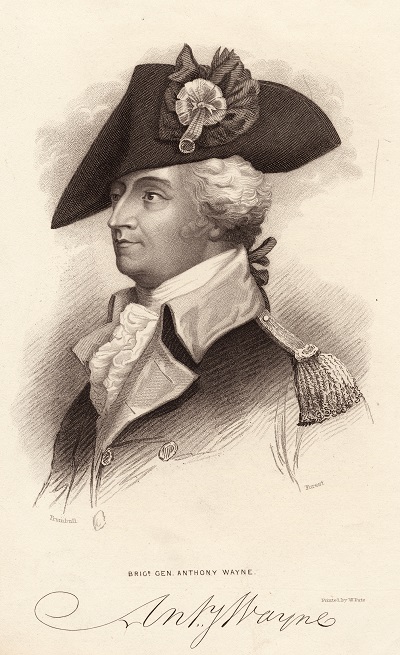
Anthony Wayne, also known as “Mad Anthony,” was a general in the Continental Army during the Revolutionary War. He later led the U.S. Army in the Battle of Fallen Timbers, which ended the Native American resistance to the country’s Midwest expansion.
Early Life
Anthony Wayne was born on January 1, 1745, in Easttown Township, Chester County, Pennsylvania. He attended the College of Philadelphia and went on to become a surveyor. In 1765, Benjamin Franklin and several other landowners sent him to survey land granted to them in Nova Scotia. When Wayne returned, he went to work in his father’s tannery. He also entered public service, serving in the Pennsylvania Legislature from 1774-1775. Wayne married Mary Penrose in 1766 and they had two children.
Revolutionary War
In 1775, Wayne raised a militia. One year later, he became the colonel of the Continental Army’s 4th Pennsylvania Regiment. Wayne and his men were sent to Canada, where he was wounded at the Battle of Three Rivers.
In 1779, Wayne commanded an attack against British soldiers at Stony Point, New York. His forces captured the entire garrison, a key victory that boosted the morale of the Patriots. Wayne earned the nickname “Mad Anthony” because of his bold actions and personal bravery on the battlefield. One year later, Wayne helped thwart Benedict Arnold’s treasonous plan to surrender West Point to the British military by safeguarding the fort.
In 1781, Wayne’s force took part in the Continental Army’s victory at Yorktown. After Cornwallis surrendered, Wayne was sent to bolster Gen. Nathanael Greene’s army in the South, where they eventually recaptured Georgia.
Later Life
When the Revolutionary War ended, Wayne was granted land in Georgia in recognition of his military service. Wayne went on to represent the state in the U.S. House of Representatives from 1791 to 1792.
In 1792, President George Washington appointed Wayne as the commander of the U.S. Army of the Northwest. He was tasked with training soldiers to end the resistance of the Northwest Indian Confederation. To protect frontier settlers in the Midwest, Wayne ordered the construction of several forts, including Fort Recovery, Fort Defiance, and Fort Greene Ville.
Wayne’s soldiers ultimately defeated several Native American tribes at the Battle of Fallen Timbers. The victory resulted in the Treaty of Greenville, which ended the Northwest Indian War.








